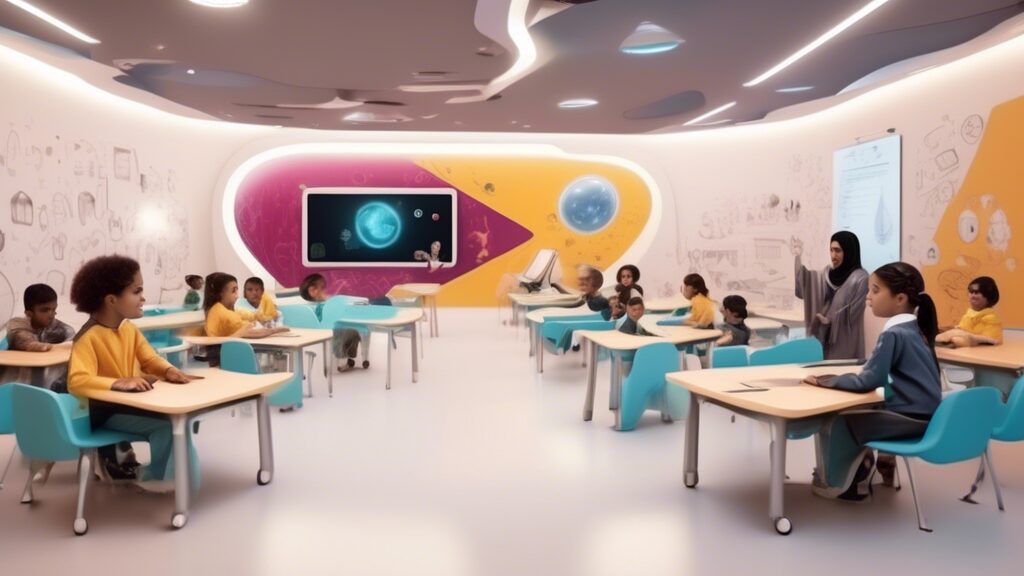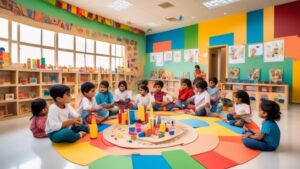Establishing a special needs school in Qatar presents a unique opportunity to make a significant impact on the lives of children with diverse learning needs. As the demand for specialized education continues to grow, understanding the key considerations for setting up such educational institutions is crucial. The process begins with navigating the regulatory and legal framework, where adherence to the Ministry of Education’s guidelines is essential for obtaining the necessary certifications and ensuring compliance. Additionally, careful infrastructure and resource planning are paramount. This involves creating accessible facilities that are well-equipped with the latest educational tools and technologies specifically designed for special needs education, thereby fostering an environment conducive to learning and development.
Beyond the logistical aspects, Qatar’s burgeoning education sector offers numerous opportunities for growth and collaboration. A thorough assessment of societal needs reveals an increasing demand for specialized education services across the country, driven by demographic trends and varying regional requirements. This not only highlights the necessity for such institutions but also identifies areas of potential growth and impact. Furthermore, the chance to form partnerships with both local and international organizations presents an avenue for enriching the educational experience. Collaborating with these entities can aid in curriculum development, enhance teacher training, and facilitate resource sharing, consequently elevating the quality of education offered to students with special needs. By capitalizing on these opportunities and addressing key considerations, establishing a special needs school in Qatar can prove to be a rewarding venture that contributes positively to the community.
Understanding the Key Considerations for Special Needs School Setup in Qatar
Examine the Regulatory and Legal Framework
When it comes to launching a special needs school in Qatar, understanding the regulatory and legal framework is a crucial first step. The process involves navigating through a comprehensive set of guidelines provided by the Ministry of Education and Higher Education. These guidelines ensure that all educational institutions meet specific standards and practices, particularly when catering to students with special needs. Here’s what you need to consider:
- Legal Requirements: Potential school founders must first ensure their institution aligns with the legislative requirements dictated by Qatari law. This includes registering the school as an educational entity and obtaining the necessary licenses. Familiarize yourself with Law No. 25 of 2001 that regulates private education in Qatar to understand the obligations of educational establishments.
- Certifications and Approvals: The process of setting up a special needs school requires specific approvals and certifications. This includes accreditation by both local authorities and international bodies that can validate the quality of the teaching and care you plan to provide. Seeking the endorsement from recognized entities is critical for establishing legitimacy and trust.
Compliance with these legal frameworks not only ensures that the school operates within the law but also enhances its reputation as a trustworthy institution dedicated to providing quality education to students with special needs.
Infrastructure and Resource Planning
Developing a robust infrastructure is another key consideration for a special needs school setup in Qatar. Creating an environment that is both physically accessible and conducive to learning for students with diverse needs is vital. Here are the main points to address:
- Accessible Facilities: It’s important that all aspects of the school environment are designed to be accessible to all students. This means building ramps, installing elevators, and ensuring that all classrooms and common areas are easy to navigate for students using wheelchairs or other mobility aids.
- Latest Educational Tools and Technologies: Integration of modern technology is essential in enhancing learning experiences for special needs students. Interactive whiteboards, adaptive learning software, and assistive technology such as speech-to-text tools can significantly improve engagement and understanding.
- Tailored Classroom Setup: Special needs students often thrive in environments specifically tailored to their learning styles. Classrooms should be equipped with sensory-friendly furniture, soundproofing materials, and adequate lighting to accommodate students with sensitivities.
- Safety and Comfort: Safety protocols should be a priority with emergency systems that are accessible to all students. Additionally, creating spaces that are inviting and comfortable can positively impact students’ willingness to engage and participate actively.
Proper infrastructure and resource planning not only facilitate effective learning but also affirm the institution’s commitment to supporting the needs and well-being of its students. By focusing on these considerations, potential school founders can create an inclusive and enriching educational environment for all attendees.
With the increasing awareness and demand for specialized education in Qatar, carefully addressing these key considerations can place a new special needs school in a strong position to succeed and make a meaningful impact on the community.
Looking to Start an Educational Institution in Qatar? Contact Us!

Exploring the Opportunities in the Special Needs Education Sector in Qatar
Addressing Demand and Community Needs
The demand for specialized education services in Qatar is steadily growing. This is influenced by several factors, making the establishment of a special needs school a promising endeavor. By understanding these demands and community needs, potential school founders can better align their services to meet the existing gaps in Qatar’s education landscape.
- Growing Population: Qatar’s population is continually increasing, leading to a rise in the number of children requiring specialized education. This growth highlights the urgent need for more special needs schools to cater to a diverse student base.
- Inclusive Education Policies: The government is pushing towards a more inclusive education system, encouraging the development of facilities that support children with different learning needs. This trend provides an opportunity for new schools to receive support and recognition.
- Gaps in Current Offerings: Despite the presence of some special needs facilities, there are still notable gaps in the services offered. Regions with limited access to specialized education present significant opportunities for setting up new schools.
- Parental Demand: Parents in Qatar are increasingly aware of the importance of specialized education for their children. They are advocating for quality education tailored to their child’s needs, making demand for such services robust.
These factors underline the potential for new special needs schools to thrive in Qatar, effectively meeting both a market and community need. The establishment of such schools not only addresses gaps but also fosters a more inclusive society.
Collaboration with Local and International Organizations
Engaging in partnerships can significantly enhance the quality and breadth of special needs education in Qatar. By collaborating with various organizations, schools can benefit from shared expertise, resources, and best practices. Here’s how these collaborations open doors to multiple opportunities:
- Partnership with Local Educational Institutions:
- Local universities and colleges offer programs and training specifically for special education. Partnering with these institutions can provide opportunities for ongoing teacher training and curriculum enhancements tailored to the local context.
- Collaborating with existing schools can also pave the way for shared resources and facilities, allowing schools to pilot inclusive education programs and integrate best practices in special needs education.
- Collaboration with Global Organizations:
- Engaging with international educational bodies and NGOs brings global best practices and innovative teaching methodologies into the Qatari context, enriching the curriculum offered at special needs schools.
- Global partnerships can also facilitate exchange programs and professional development courses for teachers, equipping them with advanced skills and competencies essential for special education.
- Leveraging Technology and Innovation:
- Teaming up with tech companies can lead to the development of tailored educational tools and assistive technologies tailored for special needs students, improving teaching methods and educational outcomes.
Overall, collaborations strengthen the capability of special needs schools to deliver high-quality education. By working with both local and international partners, schools can develop a robust support network to ensure their success and sustainability.
In conclusion, the special needs education sector in Qatar presents numerous opportunities for growth and development. By carefully addressing community needs and leveraging collaborative partnerships, new special needs schools can significantly contribute to the educational landscape in Qatar, making a lasting and positive impact on students, families, and the broader community.
In conclusion, the establishment of special needs schools in Qatar presents both significant challenges and lucrative opportunities. Understanding the key considerations for setting up such institutions is crucial for success. Adhering to the regulatory and legal framework ensures compliance with the Ministry of Education’s guidelines, safeguarding the school’s operations and reputation. Moreover, strategic infrastructure and resource planning are vital to create accessible and conducive learning environments equipped with the latest tools and technologies tailored for special needs education.
On the opportunity side, there is a pronounced and growing demand for specialized education services in Qatar, driven by the increasing awareness and recognition of the importance of inclusive education. This demand is especially evident in certain regions where demographic trends highlight a need for more tailored educational services. By addressing these needs, potential school founders can establish institutions that not only fulfill a vital societal role but also position themselves as pioneers in an emerging sector.
Furthermore, collaboration with local and international organizations opens pathways for enriching curriculum development, enhancing teacher training, and fostering resource sharing. These partnerships can significantly elevate the quality of education provided, ensuring that schools meet world-class standards. By engaging with global counterparts, schools in Qatar can bring diversified and enriched learning experiences to students, thus broadening the educational landscape.
Ultimately, the positive impact of setting up special needs schools in Qatar extends beyond educational services. It contributes to societal progress by fostering inclusion, allowing children with special needs to reach their full potential. By doing so, these institutions help build a more inclusive society where every child is given the opportunity to thrive. This effort not only benefits the students and their families but also enriches the community as a whole, making it a profoundly rewarding endeavor.
Looking to Start an Educational Institution in Qatar? Contact Us!






